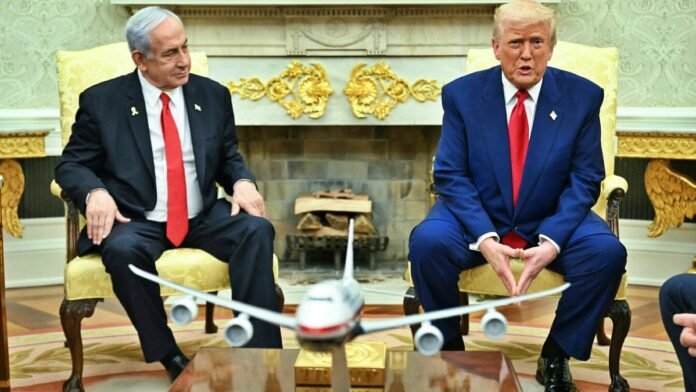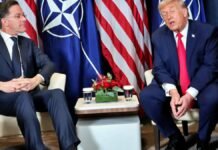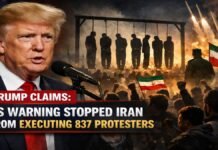
Key Points:
- Netanyahu meets Trump at White House on Monday, September 29, 2025, for fourth meeting since January 2025
- Trump’s ambitious 21-point peace plan includes 48-hour hostage release and phased Israeli troop withdrawal from Gaza
- Gaza death toll surpasses 66,000 Palestinians as war enters 16th month since October 7, 2023 attack
- Trump firmly opposes Israeli annexation of West Bank, stating “I will not allow it” ahead of meeting
- 48 hostages remain in Hamas captivity with approximately 20 believed alive according to Israeli estimates
- Netanyahu expected to present reservations and push for changes to ceasefire proposal during discussions
- Meeting includes lunch, bilateral talks, and joint press conference scheduled for 1:15 PM local time
Washington D.C: Israeli Prime Minister Benjamin Netanyahu arrives at the White House today for a make-or-break meeting with President Donald Trump that could determine the future of the devastating Gaza conflict and reshape Middle Eastern geopolitics.
Trump’s Ambitious 21-Point Peace Framework
President Trump has unveiled an unprecedented 21-point proposal aimed at ending the Israel-Hamas war that has raged for over 15 months, claiming “we have a real chance for greatness in the Middle East” ahead of Monday’s crucial summit. The comprehensive plan, shared with regional leaders during last week’s UN General Assembly, represents the most detailed American peace initiative since Trump returned to office in January 2025.
Key components of Trump’s proposal include an immediate ceasefire, release of all 48 hostages within 48 hours, and a phased withdrawal of Israeli forces from Gaza. The plan also envisions increased humanitarian aid to Gaza and establishes a framework for post-war governance, though specific details about Palestinian Authority involvement remain contentious.
Trump expressed optimism on social media Sunday, declaring that “all are on board for something special, first time ever. We will get it done”. However, the president’s claims face significant skepticism given the complex nature of previous failed negotiations and deep-rooted disagreements between the parties.
Netanyahu’s Reservations and Strategic Dilemma
Despite public coordination rhetoric, Netanyahu is expected to present substantial reservations about Trump’s peace framework during their private discussions. Three Israeli officials confirmed that the Prime Minister will advocate for significant modifications to the ceasefire plan, highlighting persistent disagreements over post-war Gaza governance and Palestinian statehood aspirations.
The most contentious issues revolve around Palestinian Authority involvement in governing post-war Gaza and Trump’s inclusion of pathways toward a future Palestinian state. Netanyahu has consistently rejected both concepts, comparing Palestinian statehood to “giving Al-Qaeda a state one mile from New York City after September 11” during his recent UN address.
Netanyahu cleared his Sunday schedule to huddle with top advisers in preparation for the White House meeting, indicating he anticipates significant disagreements with Trump’s proposals. This strategic preparation follows his previous April visit to Washington, where he encountered unexpected pressure from the Trump administration on various Middle East issues.
West Bank Annexation Confrontation
The meeting occurs against the backdrop of Trump’s firm rejection of Israeli plans to annex parts of the West Bank, with the President stating unequivocally “I will not allow Israel to annex the West Bank. It’s not going to happen”. This position directly contradicts the agenda of Netanyahu’s far-right coalition partners and settler movement leaders who view annexation as essential to preventing Palestinian statehood.
Leaders of the Yesha Council, representing Jewish settlements in the West Bank, have arrived in Washington to pressure Trump on annexation issues. Their emergency visit underscores the internal Israeli political pressure Netanyahu faces from his coalition’s right flank, who may consider breaking the government if their annexation priorities are abandoned.
International pressure against West Bank annexation has intensified recently, with multiple Western nations including the UK, France, Germany, and others formally recognizing Palestinian statehood in recent weeks. UN Secretary-General António Guterres has described potential annexation as “morally, legally, and politically intolerable.”
Escalating Humanitarian Crisis and Hostage Situation
The Gaza death toll has surpassed 66,000 Palestinians according to the Hamas-run Health Ministry, with women and children comprising roughly half of the casualties. These figures, considered credible by UN and independent monitors, underscore the urgent humanitarian imperative driving international peace efforts.
Forty-eight hostages remain in Hamas captivity from the original October 7, 2023 attack, with Israeli intelligence estimating approximately 20 are still alive. The hostage crisis continues to be a central concern for Israeli families and a key component of any potential ceasefire agreement.
Hamas has indicated readiness to consider proposals from mediators “in a constructive and responsible manner” while safeguarding Palestinian national rights, though the organization claims it has not received Trump’s updated ceasefire framework. Previous negotiation rounds collapsed in July 2024 when both the US and Israel withdrew from talks, citing Hamas’s failure to engage in good faith discussions.
Regional Diplomatic Momentum
Trump’s peace initiative has generated unprecedented regional interest, with Arab leaders engaging directly on the proposal during UN General Assembly meetings in New York. The administration claims broad regional support for the framework, though specific commitments from key players like Egypt, Qatar, and Saudi Arabia remain unclear.
The meeting represents Netanyahu’s fourth White House visit since Trump’s January 2025 inauguration, demonstrating the unprecedented frequency of US-Israeli consultations during this critical period. However, Netanyahu’s increasing dependence on Trump’s support leaves him vulnerable as Western allies continue distancing themselves from Israeli policies.
Today’s lunch meeting and joint press conference scheduled for 1:15 PM will provide the first public indication of whether the two leaders can bridge their substantial differences on Gaza’s future, Palestinian statehood, and West Bank annexation. The outcome could determine not only the war’s trajectory but also the broader realignment of Middle Eastern geopolitics under Trump’s second presidency.




















































